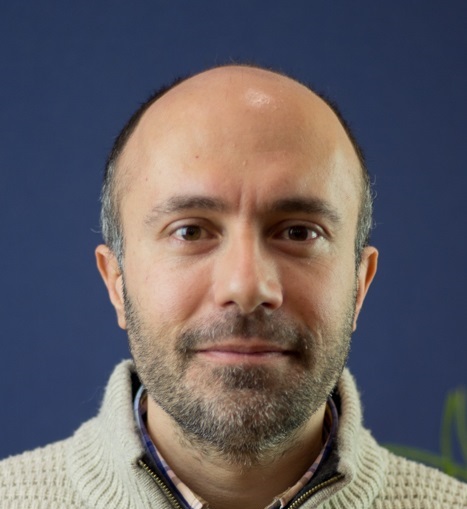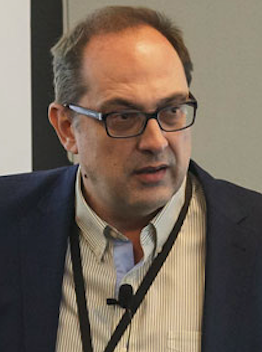Keynotes Speakers

|
Iolanda Leite is an Associate Professor at the School of Electrical Engineering and Computer Science at KTH Royal Institute of Technology. She holds a PhD in Information Systems and Computer Engineering from IST, University of Lisbon. Prior to joining KTH, she had postdoctoral appointments at Yale University and at Disney Research. Her research goal is to develop social robots that can perceive, learn from and respond appropriately to people in real-world situations, allowing for truly efficient and engaging long-term interactions with people. She is PI of a Starting Grant from the Swedish Research Council (2018-2021), the recipient of a globally competitive Early Career Fellowship awarded by the Jacobs Foundation, and was recently awarded one of the individual grants by the Swedish Foundation for Strategic Research's Future Research Leaders program (2020-2025). She is also a member of the HRI Steering Committee and the Co-editor in Chief of AI Matters, the newsletter of the ACM Special Interest Group in Artificial Intelligence (SIGAI). |
|
Title: Autonomous Social Robots in the Real World: Current Challenges and Future Directions Abstract: As social robots move out of controlled laboratory environments to be deployed in the real world, a long-standing barrier is the need to respond and adapt to both users and to the dynamics of the environment over long periods of time. In this talk, I will present my past and current research towards enabling robots with the social capabilities that will enable them to engage people. I will also discuss limitations of the current state of the art in robotic technology suitable for realistic social environments, arguing that an improved understanding of how robots perceive, reason and act depending on their surrounding social context can lead to more natural, enjoyable and useful human-robot interactions in the long-term. |

|
George Theodorakopoulos received the Diploma degree from the National Technical University of Athens, Greece, in 2002, and the M.S. and Ph.D. degrees from the University of Maryland, College Park, MD, USA, in 2004 and 2007, all in electrical and computer engineering. He is a Senior Lecturer at the School of Computer Science and Informatics, Cardiff University, which he joined in 2012. From 2007 to 2011, he was a Senior Researcher at the Ecole Polytechnique Federale de Lausanne (EPFL), Switzerland. He is a coauthor (with John Baras) of the book Path Problems in Networks (Morgan & Claypool, 2010). He received the Best Paper award at the ACM Workshop on Wireless Security, October 2004, for "Trust evaluation in ad-hoc networks" and the 2007 IEEE ComSoc Leonard Abraham prize for "On trust models and trust evaluation metrics for ad hoc networks." He coauthored "Quantifying Location Privacy," which was runner-up for the 2012 PET Award (Award for Outstanding Research in Privacy Enhancing Technologies). |
|
Title: Location privacy from a statistical perspective Abstract: One way to view privacy in general, and location privacy in particular, is as a statistical inference problem: The adversary makes noisy observations of the user's true information (location) and then tries to infer the actual value. This leads naturally to a game between the user and the adversary, in which the user may also be constrained in the amount of noise that can be added. This talk will explore past and current results in this area, and contrast the statistical point of view with other approaches to location privacy. |

|
Milos Manic is a Professor with the Computer Science Department and Director of VCU Cybersecurity Center at Virginia Commonwealth University. He completed over 40 research grants in data mining and machine learning applied to cyber security, critical infrastructure protection, energy security, and resilient intelligent control. Dr. Manic has given over 40 invited talks around the world, authored over 200 refereed articles in international journals, books, and conferences, holds several U.S. patents and has won 2018 R&D 100 Award for _Autonomic Intelligent Cyber Sensor (AICS), one of top 100 science and technology worldwide innovations in 2018. He is an inductee of the US National Academy of Inventors (class of 2019) and a Fellow of Commonwealth Cyber Initiative (specialty in AI & Cybersecurity). He is an IEEE Fellow, recipient of IEEE IES 2019 Anthony J.Hornfeck Service Award, 2012 J. David Irwin Early Career Award, 2017 IEM Best Paper Award and serves as an associate editor of Transactions on Industrial Informatics, Open Journal of Industrial Electronics Society, and is IES Officer and Senior AdCom member. He served as associate editor of Trans. on Industrial Electronics, was a founding chair of IEEE IES Technical Committee on Resilience and Security in Industry, and general chair of IEEE IECON 2018, IEEE HSI 2019. |
|
Title: Trusting AI: helping AI make the right decisions and fighting the bad bias Abstract: Trustworthy AI and explainable AI (XAI) have become burning issues in recent years. The proliferation of AI governed systems like autonomous vehicles or IoT devices is bringing a plethora of controversial questions of trustworthy AI including but not limited to secure, privacy preserving, explainable, reliable AI. In addition, AI or algorithmic bias have been reported in various instances of commercial tools. This talk will illustrate some of the contemporary problems in AI deployment, and present approaches on how to fight bad bias with good bias, how to deal with uncertainty in AI, and how to ultimately help AI make right decisions for right reasons. |